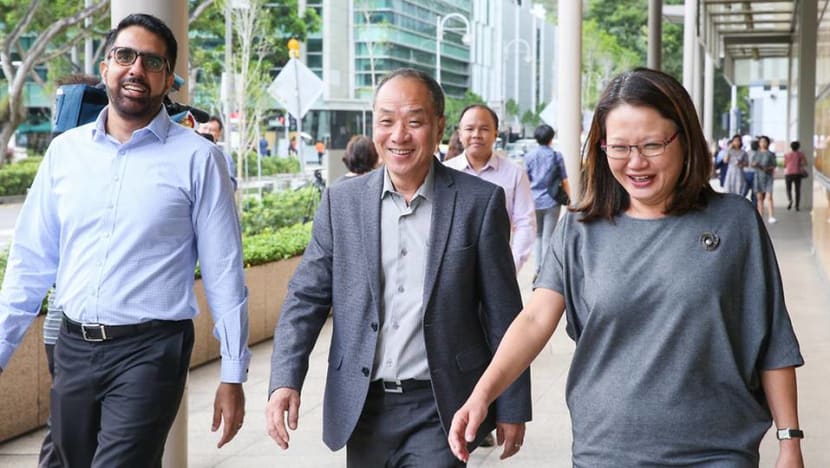AHTC trial: Defendants used residents' hard-earned money to improve political standing, claims Davinder Singh

(From left) Workers' Party MPs Pritam Singh, Low Thia Khiang and Sylvia Lim leaving the Supreme Court on Oct 8, 2018. (Photo: Koh Mui Fong/TODAY)
SINGAPORE: The defendants in a trial over the alleged misuse of town council funds had used the hard-earned money of residents to improve their political standing, claimed lawyer Davinder Singh in his oral submissions for the Aljunied-Hougang Town Council (AHTC) trial on Tuesday (Apr 9).
It was argued that the appointment of FM Solutions and Services (FMSS) as managing agent for AHTC was political in nature - an allegation that was addressed in court by lawyers for various parties.
Justice Kannan Ramesh reserved judgment after hearing submissions from all sides.
The long-standing trial centres on alleged breaches of fiduciary duty by the eight defendants - Workers' Party (WP) Members of Parliament Sylvia Lim, Low Thia Khiang and Pritam Singh; AHTC town councillors Chua Zhi Hon and Kenneth Foo; FMSS itself and two of its owners.
The plaintiffs - AHTC and Pasir Ris-Punggol Town Council (PRPTC) - claim that more than S$33 million in "improper" payments were made between 2011 and 2015 to FMSS, which was owned by "conflicted" parties How Weng Fan and her late husband Danny Loh. They held positions in the town council and were "supporters" of WP.
Senior Counsel Davinder Singh, who represents PRPTC in its claims to recover losses allegedly incurred when Punggol East constituency was under WP-managed Aljunied-Hougang-Punggol East Town Council (AHPETC), told the court that the defendants “must account to the fullest extent required by law” as the country must know that the system works and works honestly, “or else there will be consequences”.
“What emerges is a very disturbing picture of political opportunism,” he said. “It is one thing to leverage on your own merits and strengths to advance your political cause. It is another to use the hard-earned monies of innocent residents to improve your political standing and to score political points.”
He asserted that if “the residents had been told of what they know today they would have stopped paying their service and conservancy charges” and “the system would have collapsed”.
“The reason it didn’t collapse is because they were misled into thinking that their monies were being put to the best possible use and that fiduciaries, people that they had elected to look after their monies, were doing their job,” he went on. “Today we know that the truth is something different.”
He added that it was “hugely disappointing that despite so many opportunities to come clean, the defendants remain unremorseful”.
SYLVIA LIM, LOW THIA KHIANG HAD THREE COLLATERAL MOTIVES: AHTC'S LAWYER
Lawyer David Chan, who represents AHTC, also referred to politically linked collateral motives he claims WP stalwarts Ms Lim and Mr Low had.
He argued that they had three motives: To protect the former employees of Hougang Town Council (HTC) and bring them over with them to AHTC when WP won Aljunied; to reward Ms How and Mr Loh as long-time WP supporters; and to position FMSS as an alternative service provider for opposition-run town councils, as there was no such entity at the time.
Lawyer Leslie Netto, who represents Ms How, her late husband and FMSS, called PRPTC’s submissions a “political campaign” in itself, saying that “it is odd that the plaintiff should resort to such political campaigning in a legal submission in a court of law”.
He asserted that the allegations were not supported by documents, witness testimonies or submissions during the 17-day trial, and stressed again that his clients were not fiduciaries and did not breach any fiduciary duties, or duties they owed to residents that the town council served.
Mr Netto also made reference to the other town councils in Singapore which “cannot be perfect”.
“All over Singapore, management of town councils have been and is in operation continuously. The many town councillors and managers cannot be perfect,” he said.
“Would errors or omissions or slips and wrong decisions made, or wrong actions taken unintentionally that were not in the interest of the residents alone amount to breach of fiduciary duties with the consequences contemplated by the plaintiffs?”
NOT ALL S$33.7 MILLION RECOVERABLE: DEFENDANTS' LAWYER
Senior Counsel Chelva Retnam Rajah, who represents the three WP MPs and town councillors in the civil lawsuits, pointed out that according to KPMG's report - one of two audit reports which the lawsuits rest on - only S$15,710 of the sum of S$33.7 million was recoverable.
To this, AHTC’s lawyer Mr Chan said that AHTC was not making a blanket claim for S$33.7 million, but instead “is claiming equitable compensation of S$33.7 million for any losses suffered by AHTC by the defendants’ breaches, unless they show otherwise in a proper account and inquiry”.
Mr Rajah again took aim at the KPMG and PwC reports that form the basis of the lawsuits, saying that the accountants who wrote the reports “were in effect second-guessing the town councillors’ decisions on the appointment of specific contractors, the terms of their appointment and the kind of fees they should be paid”, despite Parliament's intention for town councils to exercise latitude over their own decisions.
Tuesday's hearing, which was attended by three defendants - Sylvia Lim, Pritam Singh and Kenneth Foo - rounded up in the late afternoon, with a decision in the landmark trial to be made at a later date.














